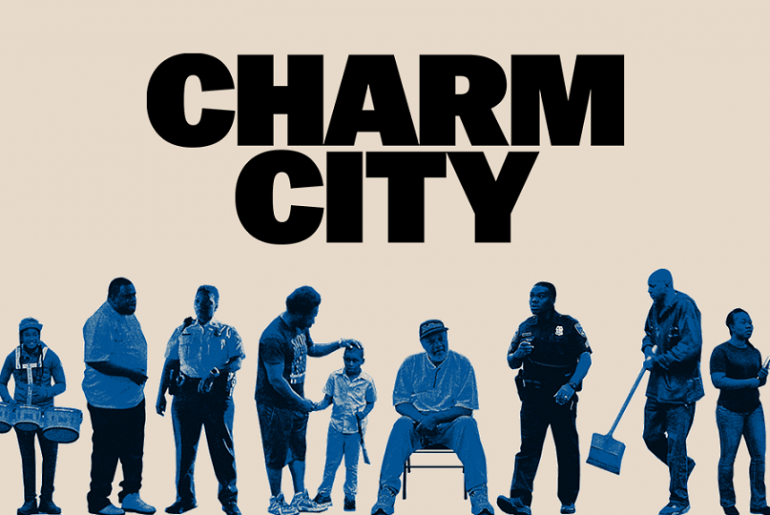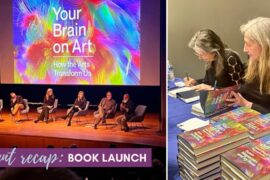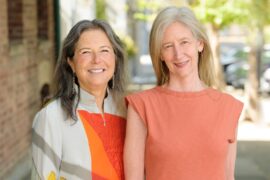Baltimore. Bawlamer – because you know, hon, we have that funny accent. Smalltimore – because everyone is connected by just one degree of separation. Whether we’ve been here for generations or came to call this city home in another way, we Bawlamereans love our city. We love our blue crabs and Natty Boh, our O’s and Ravens, our world-renowned Johns Hopkins, the miles of marble steps, the harbor, Hampden’s quirkiness, John Waters, our diverse ethnicity and all the neighborhoods that reflect it. We have a love/hate relationship with The Wire. Everyone laughs at the saying, “The best thing about living in Baltimore is that if I don’t know what I’m doing, someone else always does” because it’s so true. We are a big, small town.
Unfortunately, it’s also a city of the haves and the have nots. Safe, affluent neighborhoods, great schools, cultural and social opportunities, and good jobs are abundant for some. But for others, it’s a city of substandard schools, blocks full of vacant homes and other homes unfit to live in, a drug crisis in full bloom and claiming lives, a lack of jobs and opportunities, limited access to healthcare, homelessness, and relentlessly escalating violence, and a generation of youth that has seen too much that kids should never see, and doesn’t have hope that life can be good to them.
When we heard about the documentary, Charm City, we partnered with the Womens’ Leadership Institute of Baltimore at Notre Dame of Maryland University to bring it to the Women’s Daily Post group. The movie depicts both the hopelessness and desperation of people trying to live a life surrounded by problems and violence, and the courage and determination of those who work tirelessly at the grass-roots level to make a difference. We wanted to show the film, and then have a panel discussion with the founders of some of the grass-roots organizations, in the hopes that people would be inspired to help them or another organization. In the words of Alex Long, “Whatever you do, just do it a little more – give a little more of your time, your money – and it will make a difference.”
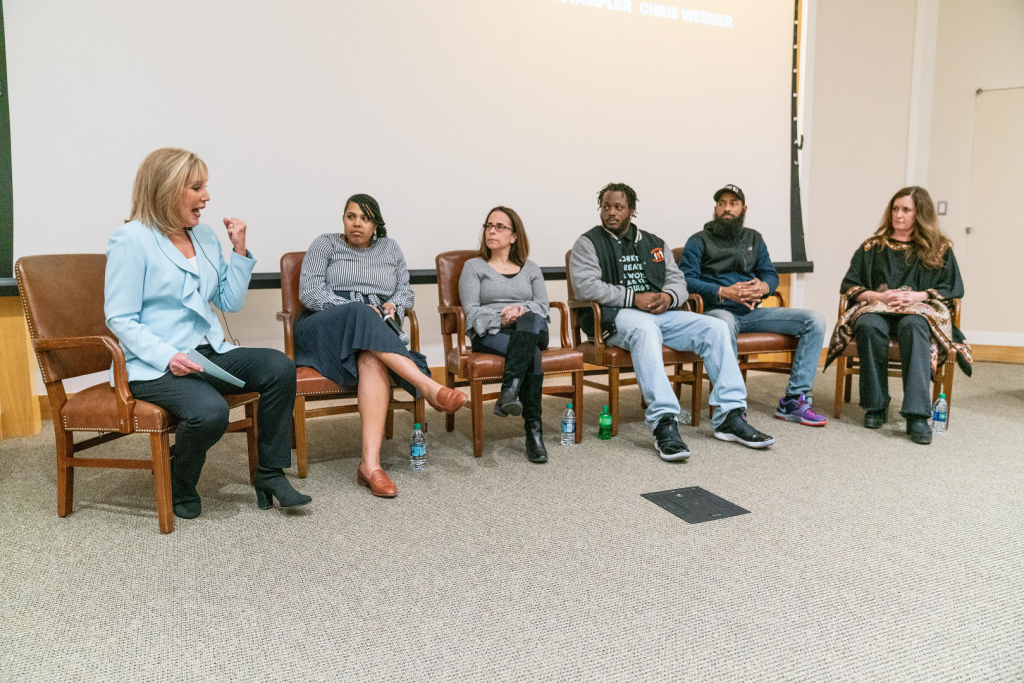
Julie E. Gabrielli shared her thoughts about the movie with us:
The press kit for the film “Charm City” describes a “candid portrait of citizens, police, community advocates, and government officials on the frontlines during three years of unparalleled, escalating violence in Baltimore. The film highlights the positive actions undertaken by groups and individuals, optimistically offering humanity as common ground.”
The story that filmmaker Marilyn Nass tells is heartbreaking, hard, and hopeful. It is full of so much love. The love of Clayton Guyton (Mr. C.) to mentor his neighbors in the Rose Street community. The love of Alex Long for his work in disrupting violence. The love of veteran police Captain Monique Brown for her family and her work. The love of Officer Eric Wilson, two years on the force, for the kids in the neighborhoods he patrols. The love of Councilman Brandon Scott for the role that innovative public policy can play in making lives and communities better.
Several of the key people in the film observe that our city is under an epidemic of violence. They are completely aware of the multiple, interlocking, and long-standing reasons for this: poverty, systemic racism, rampant unemployment and the distrust and hopelessness that flow from the daily grind of unrelenting trauma. At one point in the film, when the yearly murder tally stood at 150 or so, Alex Long makes an indisputable point. If white people were being killed at this rate, you can believe there would be an outcry. Instead, we have statistics like this: in 2016, Baltimore’s Homicide detectives closed 38% of their cases.
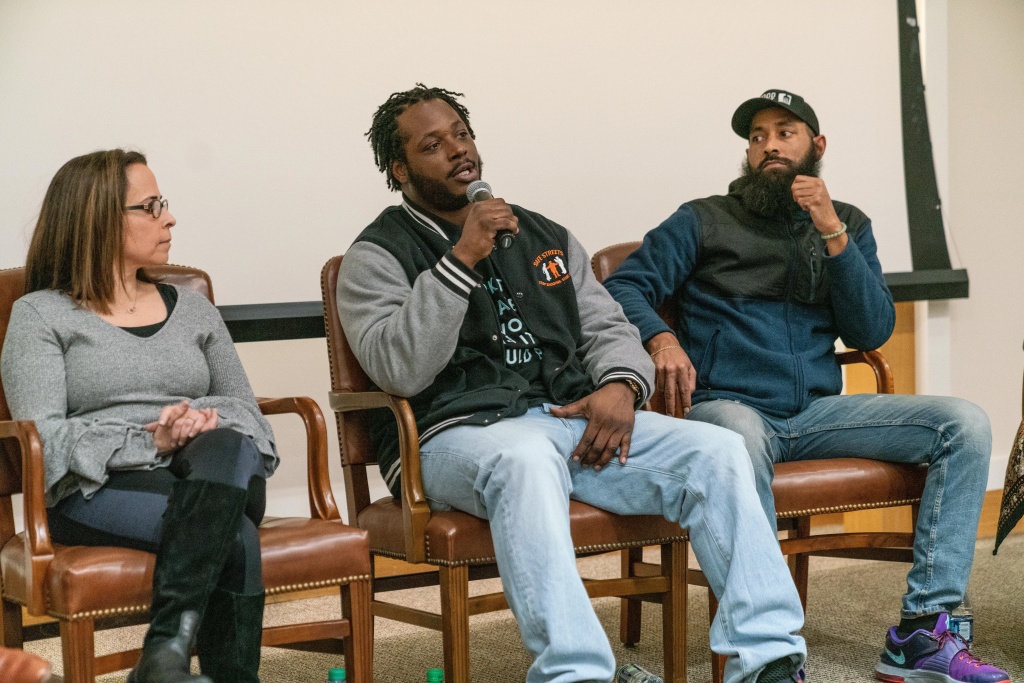
Think about that: 38%. What if your loved one was in the other 62% that went unsolved? And yet this is nearly routine for a sizable portion of our community. Add to that, the police department is shorthanded and regularly requires mandatory overtime. Not only do 12-hour shifts exhaust police officers, the overtime is nearly bankrupting the city. And the department has nothing to show for it, in the way of reducing violence.
With all this policing, it’s no wonder so many, including Alex Long, say they are living in a police state.
The essence of Baltimore comes through with love and admiration, as well as unadorned honesty. There are many touching scenes and some that are even amusing. People do some goofy things sometimes. We need that break in tone as we watch how dangerous and thankless the job of policing is. I found myself wondering at one point: why would anyone voluntarily sign up for this? In a nearly Shakespearean twist, we see that even the peacekeeper Alex Long cannot protect his own loved ones from the scourge of violence.
Councilman Scott impressed me as an idealist who takes bold action. He’s the youngest person ever elected to City Council and is first seen in the film running hill repeats in a field early on a summer morning. He takes a call on a downhill segment and finishes it saying, “I’ve got another hill to run.” Indeed he does. Many more hills.
Scott’s insight is that the violence is a symptom of a multi-strand system that is failing his constituents and many other good people of our city. He says, “Violence is a public health issue and it is not for the police alone to solve.” We get a peek inside as he convenes a transformational conversation between youth and police in his neighborhood. To watch seasoned cops opening up to teenagers is both moving and energizing. You just know Councilman Scott is on the right track here. We need more like him in our city.
I saved the program handout because it lists many of the wonderful organizations that are doing their part to be of service. They are listed below. Please look them up and connect with the ones that call to you. The screening was well-attended by Women’s Daily Post members and folks from the Institute of Notre Dame community. WJZ’s Denise Koch opened the discussion afterwards by observing that she’s now seen the film twice. The first time, she felt nearly insurmountable grief and despair. (I was at that moment wishing I’d brought more than one tissue.) After this second time, though, she felt hopeful. She noticed more about the resolve and resilience of the community leaders. And their commitment to making a difference, to caring for their vulnerable neighbors, from kids to elders, and to stemming the epidemic of violence that hangs over us all. Let’s follow their lead and do what we can to help.
Join the Fight Against Hunger and Violence in Baltimore
We hope that the Charm City screening motivates you to become more involved with grass-roots organizations in Baltimore City. All could use your time, talent and treasure.
Baltimore Hunger Project
In 2014, Lynne Kahn founded a nonprofit called Baltimore Hunger Project with the mission of eliminating weekend childhood hunger in the Baltimore metropolitan area. Although public schools in the city of Baltimore and Baltimore County do a magnificent job of providing breakfasts and lunches for their students from Monday through Friday, on the weekends, some children still won’t have enough to eat. They face the prospect of three days of hunger, growling stomachs and hardly the energy to play. It’s no wonder these youngsters find it difficult to focus and achieve in school. It’s no wonder they face unhealthy and uncertain futures. Over 200,000 children in Maryland suffer from what the U.S. Department of Agriculture has termed “food insecurity — the limited or uncertain availability of nutritionally adequate and safe foods or limited or uncertain ability to acquire acceptable foods in socially acceptable ways.” Baltimore Hunger Project addresses children’s food insecurity by discreetly tucking a weekend’s worth of food into backpacks on Fridays. In this way, they ensure that otherwise hungry children are nourished and ready for school on Mondays. Baltimore Hunger Project, a 100% volunteer-run organization, currently supports 465 children in 17 local schools every Friday, with a wait list of over 1,200 students. Our goal is to support 600 children for the upcoming school year.
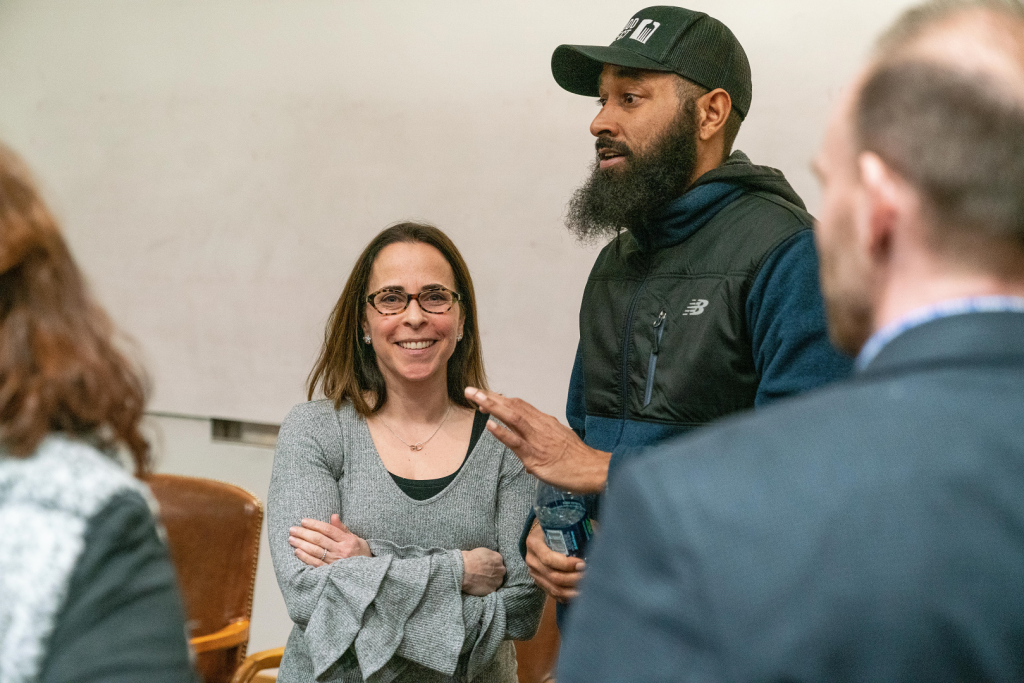
Jews United for Justice
JUFJ advances economic, racial, and social justice in the Baltimore-Washington region by educating and mobilizing local Jewish communities to advance issue-based campaigns for real, immediate, and concrete improvements in people’s lives. This year, JUFJ is focusing on juvenile justice and supporting two bills in the Maryland legislature: limiting solitary confinement of juveniles, and a bill requesting research on juvenile justice. They are opposing a mandatory minimum bill because it doubles down on the mass incarceration policies that are so destructive to communities of color.
Safe Streets
Safe Streets is an evidence-based violence prevention and interruption program that works to reduce shootings and homicides in high violence areas, operated by Catholic Charities in collaboration with the Baltimore City Department of Health.
Baltimore Ceasefire
The ultimate goal of Baltimore Ceasefire 365 is for everyone in the city to commit to zero murders. They are starting by calling for ceasefire weekends. In doing the outreach for ceasefire weekends, residents are helping each other get the resources they need in their lives, having conversations with each other about how to handle conflict differently, and making commitments to one another to be non-violent in thoughts, words, and deeds, for AT LEAST the ceasefire weekend.
Leaders of a Beautiful Struggle
LBS is a grassroots think-tank which advances the public policy interest of black people in Baltimore through youth leadership development, political advocacy, and autonomous intellectual innovation.
Johns Hopkins Center for Gun Policy and Research
The Center is dedicated to reducing gun-related injuries and deaths through the application of strong research methods and public health principles. Its faculty have pioneered innovative strategies for reducing gun violence, and achieved a national reputation for high-quality policy-relevant research.
Open Society Institute
As the Open Society Foundations’ U.S. Program’s only field office, OSA-Baltimore focuses on the root causes of three intertwined problems in our city and state: drug addiction, an over-reliance on incarceration, and obstacles that impede youth in succeeding inside and outside of the classroom. We also support a growing corps of social entrepreneurs committed to underserved populations in Baltimore.
Kids Safe Zone
The Kids Safe Zone, a drop-in center in Sandtown-Winchester for at-risk children ages 5-17 years old, offers recreation that includes flat screen TVs, Xbox gaming systems, board games, organized sports teams, a computer lab, mentoring programs, peer led support groups, licensed counseling, field trips, a study lab and homework assistance.
Rose Street Community Center
Rose Street Community Center and RSCC Youth Shelter is a faith based organization that helps with transitional housing and homeless and at risk youth.
The McElderry Youth Redemption Boxing Program, re-named Ashley’s Gardenh
Named in memory of Ashley Long, Ashley’s Garden is a community-based and driven kickboxing program in East Baltimore. Run by Alex Long, the program targets youth who have suffered violence and trauma, offering constructive and healthy alternatives to help young people cope with the everyday struggles that plague their community.
Children’s Classes with Dr. Kelly Koay
Dr. Koay helped developed free weekend classes for children, focusing on teaching virtues such as kindness, humility, love and equality. The classes are based on Koay’s practice of the Baha’i faith, which is grounded in the elimination of all prejudice in order to promote self-improvement and contribute to the advancement of society. She feels this is a vital and relevant lesson for Baltimore City, which is why she seeks children of all backgrounds to help them find common ground. The class meets Saturdays from 10-12 in East Baltimore. Email her for more information and to sign up.
Center for Urban Families
Since our founding in 1999, CFUF has remained at the front-line of addressing some of our city’s most pressing issues, including poverty, unemployment, father-absence and family disintegration. We maintain an unwavering focus on addressing the key challenges of Baltimore’s urban families by working to connect fathers to their children, creating opportunities for economic and financial security through work, and providing access to other key interventions and supportive services.
Baltimore Community Mediation Center
Since 1995, Baltimore City Community Mediation (BCMC) has provided free mediation services and teaches conflict resolution skills in neighborhoods, families, schools, business, and all across Baltimore.
Community Law in Action
CLIA’s Leadership Development and Advocacy training programs equip Baltimore City youth with the skills necessary to lead effectively and advocate for positive change in their schools, neighborhoods and city. CLIA leads the Just Kids Campaign, a statewide advocacy campaign working to stop the automatic prosecution of youth as adults in Maryland.
Youth Empowered Society
YES Drop-In Center is Baltimore City’s first and only drop-in center for homeless youth. It is a safe space for youth who are homeless and between the ages of 14-25, to get basic needs met and establish supportive relationships with peer staff and allies that them make and sustain connections to long-term resources and opportunities. Founded and run by formerly homeless youth and their allies, YES works to end youth homelessness in Baltimore by (1) providing urgently-needed direct services to youth experiencing homelessness, (2) developing the leadership and employment readiness of youth who have experienced homelessness, and (3) engaging in system-level reform.
Thread
Thread engages underperforming high school students confronting significant barriers outside of the classroom by providing each one with a family of committed volunteers and increased access to community resources. We foster students’ academic advancement and personal growth into self-motivated

